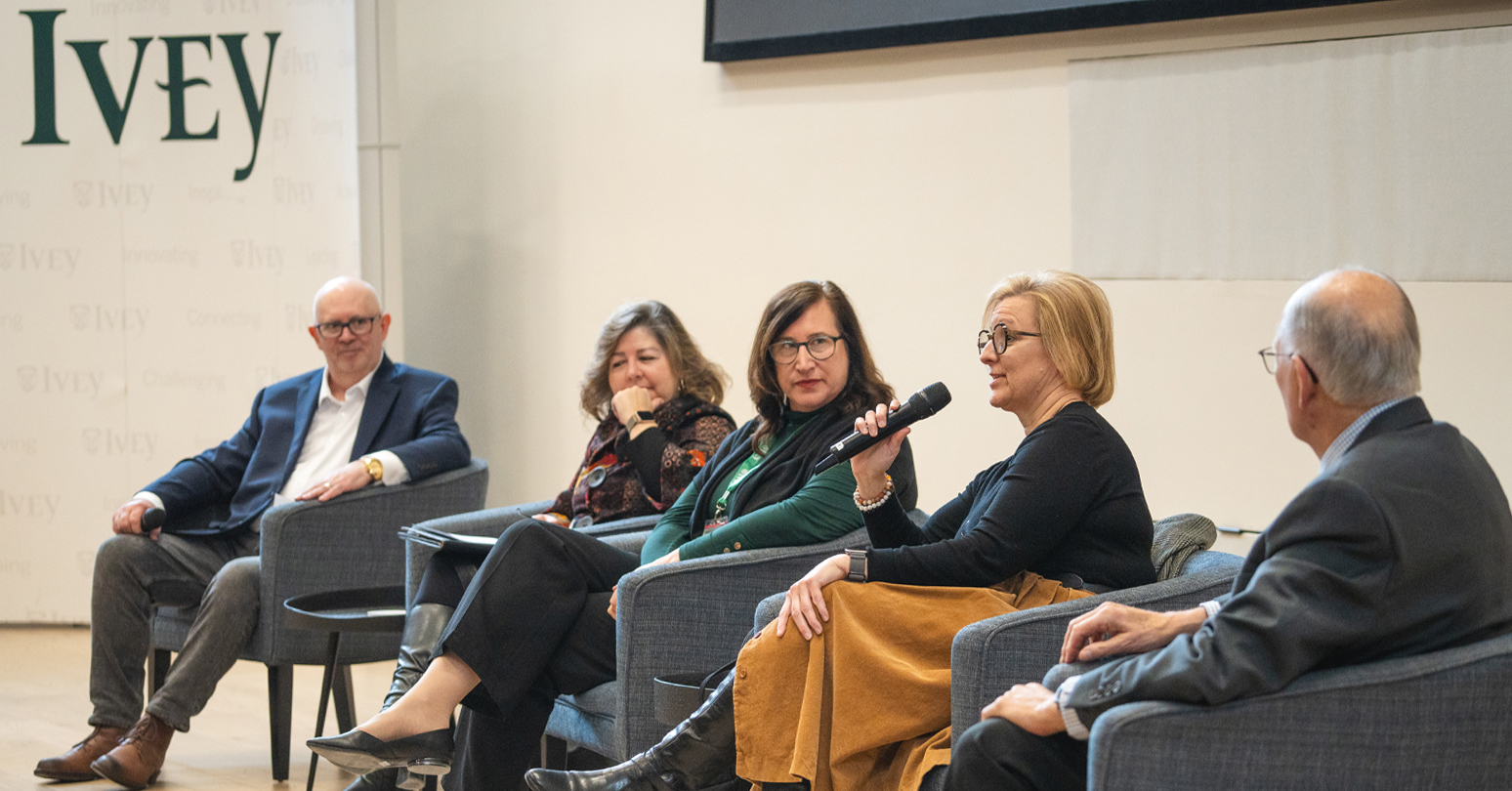Although he has built a distinguished career as a sports journalist, written three books, and received multiple awards, Jeffrey Reed says his success isn’t defined by money or status – it’s about making a difference.
Among his many achievements, Reed says he is most proud of creating the Jeffrey Reed Courage Award, an annual scholarship given to athletes who, like him, have overcome challenges. Reed himself played semi-pro baseball and became a golf professional despite having spina bifida, scoliosis, and chronic pain.
Reed was the keynote speaker for Impact Day 2.0, organized by the Ivey MBA Association (MBAA) as a complement to Social Impact Day. The event also featured a panel discussion with leaders from the non-profit sector who are making a difference. Panellists included Michelle Campbell, President and CEO of St. Joseph’s Healthcare Foundation; Lisa Citton-Battel, Executive Director of SARI Therapeutic Riding and Ivey lecturer; Kelly Ziegner, President and CEO of United Way Elgin Middlesex; and Jim Collins, Executive Director of Harvest Hands.
The goal of the event was to encourage students to reflect on how they can make an impact in their professional careers and daily lives. The students were also encouraged to make a small donation to charity during the event. A draw was held among the five represented organizations, and as a result, $265 was raised for United Way Elgin Middlesex.
Defining success beyond money and fame
During his keynote, Reed shared career highlights – interviewing Wayne Gretzky and Jack Nicklaus and travelling across North America. Despite these achievements, Reed said he often felt something was missing. He recounted how, while covering a charity golf event, he watched children living with disabilities receive adaptive golf equipment and this reminded him of the opportunities he had been given, inspiring him to give back.
In 2004, Reed launched LondonOntarioGolf.com, a website dedicated to golf news, which he also used as a vehicle for philanthropy. He later created several awards for individuals who demonstrate resilience or give back to the community. Emphasizing that giving back goes beyond financial aid – including mentoring or public speaking – his advice to the students was that true success doesn’t come from money or fame, but from helping others.
“There’s nothing wrong with making a buck. If you are going to look after other people as well as yourself, you have to make money,” he said. “But I honestly believe that, unless you are giving back to others, life can be pretty shallow … As hokey as it sounds, unless we’re giving back to others, what’s the point?”
Why purpose-driven work matters
After his speech, Reed led the discussion with the panellists, who shared how meaningful work has enriched their lives. Many had transitioned from corporate careers to non-profits and spoke about the growing demand for professionals with expertise in business, finance, and technology in the sector.
Michelle Campbell shared her personal journey, recalling how she initially joined the Foundation’s Parkwood Hospital on a short-term contract with plans to later go to graduate school. However, her career path shifted when she witnessed a patient with a spinal cord injury take her first steps during rehabilitation.
“Right away, my purpose became very defined in that mission, and you can have that, too,” she said. “Don’t think of this (non-profit work) as being on the side – think about this as a career choice. There is enormous challenge, immense variety, constant learning, and the chance to utilize your business skills for good.”
Lisa Citton-Battel, who joined SARI Therapeutic Riding after retiring from a 30-year career at 3M Canada, urged students to make philanthropy a regular part of their lives, even if they don’t work in the non-profit sector.
“Make it part of what you do. It will make your role that much more rewarding … It will pay back emotionally, mentally, physically a hundred times,” she said.
Jim Collins echoed this sentiment, noting the deep fulfillment of knowing his organization, which distributes rescued food to nearly 300 agencies, has diverted $25-million-worth of food waste in just four years.
“I think the greatest thing about volunteering for me and the volunteers we have, based on what they tell us, is that it gives them an opportunity to help other people in a real and tangible way that you feel good about,” he said. “It’s not a superficial feel good about yourself, it’s an honest feeling of doing, not only what’s good, but what is right.”
Beyond the personal fulfillment that comes with non-profit work, Kelly Ziegner highlighted another major draw: workplace culture.
“We really lean into taking care of our people from a work-life balance perspective and being ahead of some of the trends when it comes to employee benefits because sometimes we can’t offer the salaries that you get in the for-profit sector,” she said. “I think when people come to the sector, they stay in the sector because you feel great about what you do and you work with people who care about what you do.”
A call to action: Become an agent of change
In addition to learning about the opportunities and benefits of non-profit work, the students were given a call to action. Pledging to embed impact into his career and life, Mohit Gupta, an MBA ’25 candidate and President of the Ivey MBAA, urged his classmates to do the same.
“These individuals have given their heart to making the world a better place. I challenge you to reflect on how you can also contribute to this impact,” he said.



